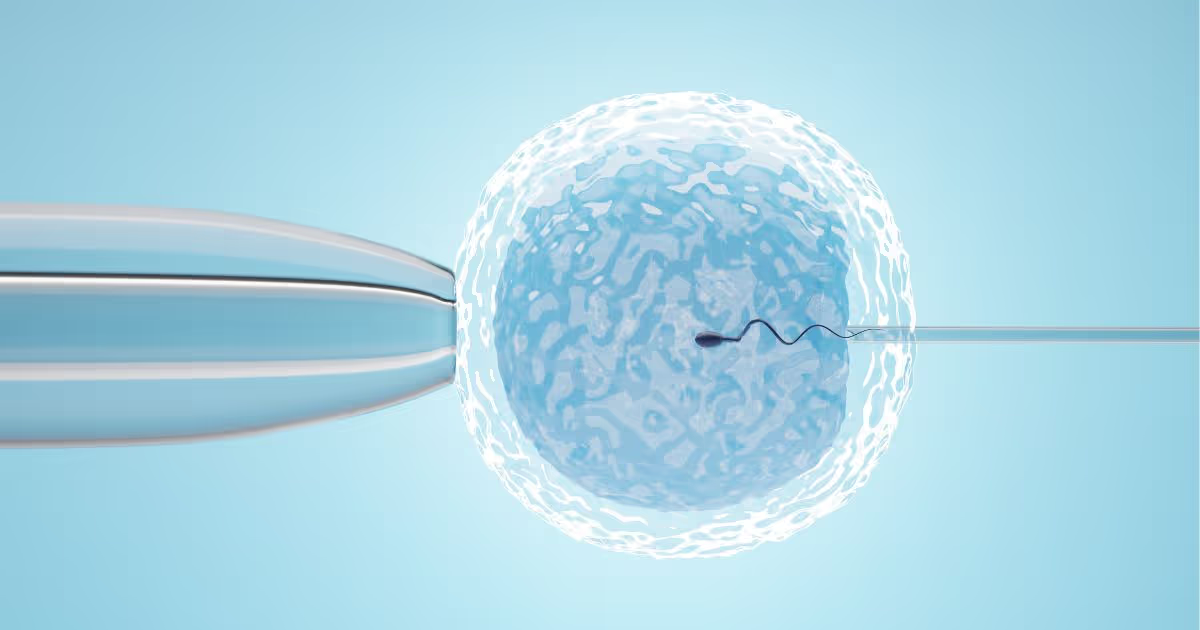- การทำเด็กหลอดแก้ว (IVF) คืออะไร?
- อิ๊กซี่ (ICSI)
- การทำอิ๊กซี่ (ICSI) มีขั้นตอนอย่างไร?
- ICSI ดีกว่า IVF อย่างไร?
- การทำ ICSI ใช้เวลานานเท่าไร?
- การทำอิ๊กซี่ (ICSI) เหมาะกับใคร?
- การทำอิ๊กซี่ (ICSI) มีโอกาสประสบความสำเร็จแค่ไหน?
- ทำอิ๊กซี่ (ICSI) มีข้อเสียอย่างไร?
- ทำอิ๊กซี่ (ICSI) มีข้อดีอย่างไร?
- ทำอิ๊กซี่ (ICSI) ที่ไหนดี?
- การทำเด็กหลอดแก้วด้วยวิธีอิ๊กซี่ (ICSI) ที่โรงพยาบาลเมดพาร์ค
- รับชมวีดีโอ ข้อควรรู้ก่อนทำ ICSI
- รู้จักทีมแพทย์เฉพาะทาง
- คำถามที่พบบ่อย
- แพ็กเกจรักษาภาวะมีบุตรยาก
- ปรึกษาแพทย์เฉพาะทางออนไลน์
การทำเด็กหลอดแก้ว (IVF) คืออะไร?
การทำเด็กหลอดแก้ว (In-vitro fertilization: IVF) คือ เทคโนโลยีช่วยเจริญพันธุ์ในผู้ที่มีบุตรยากโดยการนำอสุจิของฝ่ายชาย และไข่ของฝ่ายหญิงมาทำการปฏิสนธิในห้องปฏิบัติการทางการแพทย์ โดยปล่อยให้อสุจิและไข่ปฏิสนธิกันตามธรรมชาติ แล้วนำกลับเข้าไปฝังในโพรงมดลูกของแม่เพื่อให้เจริญเติบโตต่อไปในครรภ์จนถึงวันกำหนดคลอด การทำเด็กหลอดแก้วหรือ IVF เป็นเทคโนโลยีช่วยเจริญพันธุ์ที่มีประสิทธิภาพในปัจจุบัน ช่วยให้คู่รักที่มีภาวะมีบุตรยาก คุณผู้ชายที่มีอสุจิไม่แข็งแรง หรือคุณผู้หญิงที่มีอายุตั้งแต่ 35 ปีขึ้นไปที่มีจำนวนไข่น้อยให้สามารถตั้งครรภ์ และสร้างครอบครัวในฝันที่สมบูรณ์พร้อมได้สำเร็จ
อิ๊กซี่ (ICSI)
การทำอิ๊กซี่ (ICSI) คือ หนึ่งในเทคโนโลยีช่วยเจริญพันธุ์เพื่อรักษาผู้มีบุตรยากให้มีลูกได้สำเร็จด้วยวิธีการทำเด็กหลอดแก้วโดยการคัดสเปิร์ม (Sperm) ตัวที่แข็งแรงที่สุด และมีการเคลื่อนไหวที่ดีที่สุดเพียง 1 ตัวมาทำการฉีดด้วยเข็มขนาดเล็กโดยตรงลงไปในไข่ (Ovum) เพื่อช่วยให้เกิดการปฏิสนธิ และทำการเลี้ยงตัวอ่อนต่อในห้องปฏิบัติการทางการแพทย์จนเป็นตัวอ่อนในวันที่ 5 (Blastocyst) ก่อนย้ายกลับเข้าสู่โพรงมดลูกและฝังยังผนังเยื่อบุมดลูกเพื่อให้ตัวอ่อนเจริญเติบโตต่อไปเป็นทารกน้อย (Fetus) ในครรภ์มารดา อิ๊กซี่เป็นเทคโนโลยีทางการแพทย์ที่มีความปลอดภัยและมีความแม่นยำสูง ช่วยให้คุณผู้ชายที่มีอสุจิไม่แข็งแรง มีปริมาณอสุจิน้อย หรือเป็นหมัน รวมถึงคุณผู้หญิงที่มีจำนวนไข่น้อย เปลือกไข่หนา หรือมดลูกไม่แข็งแรงให้สามารถมีลูกน้อยได้สมใจ
การทำอิ๊กซี่ (ICSI) มีขั้นตอนอย่างไร?
ขั้นตอนก่อนการทำอิ๊กซี่
-
การตรวจร่างกาย (Physical examination)
แพทย์จะทำการตรวจร่างกายอย่างละเอียดเพื่อประเมินความพร้อมก่อนเข้าสู่กระบวนการทำอิ๊กซี่ โดยแพทย์จะทำนัดเจาะเลือดเพื่อวัดปริมาณฮอร์โมนในร่างกายโดยเฉพาะอย่างยิ่งในช่วง 2-3 วันแรกของการมีรอบเดือนเพื่อประเมินการทำงานของรังไข่ ตรวจอัลตราซาวด์ (Ultrasound) เพื่อนับจำนวนไข่ของแต่ละรอบเดือนเพื่อใช้ในการคำนวณปริมาณฮอร์โมนในการฉีดกระตุ้นรังไข่ โดยพิจารณาจากสุขภาพร่างกาย อายุ และผลการตรวจร่างกายร่วมกัน
-
การฉีดยากระตุ้นไข่ (Ovulation stimulation)
เมื่อผลการตรวจร่างกายมีความพร้อมในการทำอิ๊กซี่ แพทย์จะเข้าสู่กระบวนการเหนี่ยวนำให้ไข่ตกด้วยการฉีดฮอร์โมนกระตุ้นให้ไข่สุกหลาย ๆ ใบพร้อมกันและมีความพร้อมสำหรับการปฏิสนธิ โดยไข่จะเจริญเติบโตและสุกเต็มที่หลังฉีดยาเข็มแรกไปแล้ว 8-14 วัน
-
การติดตามการเจริญเติบโตของไข่ (Positive ovulation follow up)
แพทย์จะทำการตรวจอัลตราซาวนด์ (Transvaginal ultrasound) เป็นระยะเพื่อนับจำนวนไข่ ตรวจการเจริญเติบโตของถุงไข่ว่ามีขนาดที่เหมาะสม มีการขยายตัวอย่างเต็มที่และมีความสมบูรณ์พร้อมหรือไม่ จากนั้นแพทย์และทำการฉีดฮอร์โมนกระตุ้นให้ไข่สุก (Medications for oocyte maturation) และเตรียมความพร้อมสำหรับการเก็บไข่ภายใน 34-36 ชั่วโมง
-
กระบวนการเก็บไข่ (Egg retrieval)
เมื่อไข่ตก แพทย์จะเข้าสู่กระบวนการเก็บไข่โดยให้ยาชาอ่อน ๆ ช่วยระงับความรู้สึกก่อนทำการสอดเข็มเล่มบาง ๆ ผ่านทางช่องคลอดโดยใช้ระบบอัลตราซาวด์ประสิทธิภาพสูงนำทางไปยังตำแหน่งของไข่ใบที่ต้องการ เพื่อทำการเจาะเก็บไข่และลำเลียงไข่ออกมาทำการเพาะเลี้ยงในน้ำยาเลี้ยงไข่เพื่อให้พร้อมสำหรับการปฏิสนธิ โดยขั้นตอนนี้จะใช้เวลาเพียง 20-30 นาที
-
การเก็บอสุจิของฝ่ายชาย (Sperm collection)
ในวันนัดเก็บไข่ของฝ่ายหญิง แพทย์จะทำการนัดฝ่ายชายเข้ามาเก็บอสุจิในวันเดียวกัน หากฝ่ายชายไม่สะดวก สามารถเข้ามาทำการเก็บสเปิร์มแช่แข็งไว้ก่อนล่วงหน้าได้ โดยก่อนการเก็บสเปิร์ม แพทย์จะแนะนำให้ฝ่ายชายงดการมีเพศสัมพันธ์ งดการช่วยตัวเอง หรืองดการหลั่งน้ำอสุจิทุกรูปแบบประมาณ 2-3 วันก่อนขั้นตอนการเก็บอสุจิ
ในวันเก็บอสุจิ แพทย์จะให้ฝ่ายชายที่มีสมรรถภาพทางเพศสมบูรณ์แข็งแรงทำการช่วยตัวเองให้หลั่งลงในภาชนะปลอดเชื้อที่เตรียมไว้ภายในห้องส่วนตัวสำหรับคุณผู้ชาย ภายใน 60 นาทีหลังการหลั่ง สเปิร์มจะถูกส่งตรงไปที่ห้องปฏิบัติการทางการแพทย์เพื่อเข้าสู่กระบวนการตรวจวิเคราะห์คุณภาพน้ำเชื้อ โดยทีมแพทย์จะทำคัดเลือกอสุจิตัวที่สมบูรณ์ที่สุด แข็งแรงที่สุด และมีการเคลื่อนไหวดีที่สุดมาทำการเติมสารอาหารเพื่อช่วยหล่อเลี้ยงและเพิ่มความรวดเร็วในการเคลื่อนไหวก่อนทำการฉีดสเปิร์มเข้าสู่ไข่เพื่อไปปฏิสนธิ
สำหรับฝ่ายชายที่มีปัญหาด้านสมรรถภาพทางเพศ เช่น ภาวะท่อนำอสุจิอุดตัน (Obstruction azoospermia: OA) ภาวะหลั่งอสุจิย้อนทาง (Anejaculation) หรือภาวะหมันในเพศชาย (Male infertility) แพทย์จะใช้วิธีการเก็บตัวอสุจิโดยตรงจากอัณฑะด้วยวิธี PESA/TESE หรือการใช้เข็มขนาดเล็กดูดอสุจิจากท่อนำน้ำเชื้อ เปาะเก็บน้ำเชื้อ หรือโดยตรงจากลูกอัณฑะก่อนที่จะนำมาฉีดเข้ากับไข่ของฝ่ายหญิงเพื่อช่วยให้การปฏิสนธิง่ายขึ้น วิธีนี้ยังสามารถช่วยผู้ที่อสุจิไม่แข็งแรง อสุจิไม่สามารถทะลุผ่านเปลือกไข่เข้าไปได้ ให้สามารถผสมเข้าไปกับไข่ได้โดยตรง
ขั้นตอนระหว่างการทำอิ๊กซี่
-
ขั้นตอนการปฏิสนธิ (ICSI fertilization)
นักวิทยาศาสตร์เลี้ยงตัวอ่อนจะคัดเลือกไข่ใบที่สมบูรณ์มาวางลงบนจานทดลองและใช้หลอดแก้วใสปิเปตต์จับไข่ให้มั่นคง ก่อนที่จะใช้เข็มเล่มเล็กดูดสเปิร์มตัวที่สมบูรณ์ที่สุดเพียงตัวเดียว ฉีดเข้ากับไข่เพื่อให้เกิดการปฏิสนธิ
-
การเลี้ยงตัวอ่อนในห้องปฏิบัติการ (Embryo culture)
เมื่อเกิดการปฏิสนธิแล้ว นักวิทยาศาสตร์เลี้ยงตัวอ่อนจะทำการเลี้ยงตัวอ่อน (Embryo culture) เป็นระยะเวลาประมาณ 3-5 วัน โดยแพทย์และนักวิทยาศาสตร์เลี้ยงตัวอ่อนจะตรวจสอบพัฒนาการในการแบ่งเซลล์ของตัวอ่อนหลังการปฏิสนธิในระยะต่าง ๆ ตั้งแต่ระยะ 1 เซลล์ > 2 เซลล์ > 4 เซลล์ > 8 เซลล์ > 32 เซลล์ จนมีจำนวนเซลล์มากกว่า 100 เซลล์ที่รวมกันเป็นมวลเซลล์ (Compacted stage embryo) จนกระทั่งเจริญเติบโตเป็นตัวอ่อนในวันที่ 5 หรือระยะบลาสโตซีสต์ (Blastocyst)
โดยนักวิทยาศาสตร์เลี้ยงตัวอ่อนจะเลี้ยงตัวอ่อนในน้ำยาหล่อเลี้ยงชนิดพิเศษที่ควบคุมปัจจัยภายในห้องปฏิบัติการทางการแพทย์โดยคำนึงถึงอุณหภูมิ ความชื้น ก๊าซ และความเป็นกรด-ด่าง ให้มีความใกล้เคียงกับอุณหภูมิภายในครรภ์มารดาให้มากที่สุดเพื่อให้มีความเหมาะสมต่อการเจริญเติบโตของตัวอ่อนก่อนเข้าสู่ขั้นตอนการคัดเกรดตัวอ่อน และย้ายตัวอ่อนเข้าสู่โพรงมดลูก
ขั้นตอนหลังการทำอิ๊กซี่
-
การย้ายตัวอ่อนเข้าสู่โพรงมดลูก (Embryo transfer)
การย้ายตัวอ่อนกลับเข้าสู่โพรงมดลูก แบ่งออกเป็น 2 แบบ คือการย้ายตัวอ่อนรอบสด และการย้ายตัวอ่อนรอบแช่แข็ง
-
- การย้ายตัวอ่อนรอบสด (Fresh embryo transfer: ET) คือ การย้ายตัวอ่อนกลับเข้าสู่โพรงมดลูกในรอบที่มีการกระตุ้นไข่และเก็บไข่ทันที โดยแพทย์จะทำการย้ายตัวอ่อนกลับเข้าสู่โพรงมดลูกภายใน 5-6 วันหลังเก็บไข่ จนเป็นตัวอ่อนระยะบลาสโตซิสต์ โดยตัวอ่อนจะต้องมีพัฒนาการการเจริญเติบโตที่ดี มีความสมบูรณ์แข็งแรง และฝ่ายหญิงมีความพร้อมในการตั้งครรภ์โดยแพทย์จะใช้ระบบอัลตราซาวด์ทางหน้าท้องนำทางในการฝังตัวอ่อนลงในตำแหน่งที่เหมาะสมในโพรงมดลูกเพื่อช่วยให้ตั้งครรภ์ได้อย่างราบรื่น
- การย้ายตัวอ่อนรอบแช่แข็ง (Frozen embryo transfer: FET) คือ การย้ายตัวอ่อนกลับเข้าสู่โพรงมดลูกในรอบเดือนถัด ๆ ไป เพื่อหลีกเลี่ยงผลข้างเคียงจากภาวะรังไข่ถูกกระตุ้นเกิน (Ovarian hyperstimulation syndrome: OHSS) ภาวะเยื่อบุโพรงมดลูกหนาเกินไป (Endometrial hyperplasia) หรือมีภาวะบวมน้ำ (Edema) โดยแพทย์จะทำการเก็บตัวอ่อนแช่แข็งเก็บไว้ และจะละลายออกมาเมื่อร่างกายมีความพร้อมสำหรับขั้นตอนการย้ายตัวอ่อนเข้าสู่โพรงมดลูกในรอบเดือนถัด ๆ ไป
-
การตรวจการตั้งครรภ์ (Pregnancy test)
แพทย์จะทำนัดเพื่อตรวจการตั้งครรภ์หลังเสร็จสิ้นขั้นตอนการย้ายตัวอ่อนเข้าสู่โพรงมดลูกแล้วประมาณ 10 วัน โดยแพทย์จะตรวจว่าตั้งครรภ์หรือไม่โดยการตรวจเลือดเพื่อวัดระดับฮอร์โมน Beta-HCG ตรวจประเมินอาการหลังย้ายตัวอ่อนเข้าสู่ครรภ์ เมื่อการตั้งครรภ์ราบรื่นเป็นปกติดีก็จะเข้าสู่ขั้นตอนการฝากครรภ์ตามปกติ โดยแพทย์จะทำนัดเพื่อติดตามอาการของว่าที่คุณแม่รวมถึงทำอัลตราซาวด์เพื่อตรวจพัฒนาการของทารกในครรภ์เป็นระยะ
ICSI ดีกว่า IVF อย่างไร?
ทั้งการทำ IVF และการทำ ICSI ต่างเป็นวิธีการทำเด็กหลอดแก้วที่มีประสิทธิภาพและช่วยให้ผู้ที่มีภาวะมีบุตรยากสามารถมีลูกได้ทั้ง 2 วิธี ทั้งนี้แพทย์จะแนะนำวิธีการทำเด็กหลอดแก้วที่เหมาะสมที่สุดกับแต่ละคู่โดยพิจารณาจากผลการตรวจไข่ของฝ่ายหญิง และความแข็งแรงของสเปิร์มของฝ่ายชาย หากฝ่ายหญิงมีเปลือกไข่หนากว่าปกติที่อาจทำให้อสุจิไม่สามารถเจาะเข้าไปผสมได้ หรือฝ่ายชายมีสเปิร์มที่ไม่แข็งแรงหรือมีการเคลื่อนไหวที่ไม่ดี การทำ ICSI โดยการฉีดสเปิร์มเข้าไปในไข่โดยตรงเพื่อให้เกิดการปฏิสนธิและตั้งครรภ์จะช่วยแก้ปัญหานี้ได้อย่างตรงจุด
การทำ ICSI ใช้เวลานานเท่าไร?
โดยปกติ การทำอิ๊กซี่ (ICSI) หนึ่งรอบใช้เวลาประมาณ 4-6 สัปดาห์ เริ่มตั้งแต่การตรวจร่างกาย ตรวจเลือดเพื่อวัดระดับฮอร์โมน และการฉีดยากระตุ้นให้ไข่ตก 9-10 วัน กระบวนการเก็บไข่และสเปิร์มจะใช้เวลาครึ่งวัน จากนั้น จึงเลี้ยงตัวอ่อนในห้องปฏิบัติการทางการแพทย์ 5-6 วัน ในระยะนี้ หากตัวอ่อนมีพัฒนาการที่ดี แพทย์จะทำนัดให้เข้ามาที่รพ. เพื่อเข้าสู่กระบวนการย้ายตัวอ่อนเข้าสู่โพรงมดลูกเพื่อให้ตัวอ่อนได้เจริญเติบโตต่อไปในครรภ์มารดาจนกลายเป็นทารก
การทำอิ๊กซี่ (ICSI) เหมาะกับใคร?
การทำอิ๊กซี่ (ICSI) เหมาะสำหรับการรักษาผู้ที่มีภาวะมีบุตรยากดังต่อไปนี้
- ภาวะมีบุตรยากในเพศหญิง (Female infertility) เช่น เยื่อบุโพรงมดลูกเจริญผิดที่ (Endometriosis) ท่อนำไข่บวมหรืออุดตัน (Hydrosalpinx) ภาวะไม่ตกไข่ (Anovulation) ภาวะตกไข่ผิดปกติ (Ovulation disorder) ความผิดปกติของระบบสืบพันธุ์ (Reproductive system diseases) และความผิดปกติจากสาเหตุอื่น ๆ
- ภาวะมีบุตรยากในเพศชาย (Male infertility) เช่น ภาวะท่อนำอสุจิอุดตัน (Obstruction azoospermia: OA) ภาวะหลั่งอสุจิย้อนทาง (Anejaculation) หรือภาวะหลอดเลือดดำในถุงอันฑะโป่งพอง (Varicocele) และความผิดปกติจากสาเหตุอื่น ๆ
- คุณผู้หญิงที่มีอายุ 35 ปีขึ้นไปที่ทำให้มีปริมาณและคุณภาพของไข่ลดลง มีเปลือกไข่หนา สเปิร์มไม่สามารถเจาะเข้าไปได้
- คุณผู้หญิงที่ผ่านการทำหมันมาแล้ว (Female sterilization) โดยการผูกท่อนำไข่ ตัดท่อนำไข่ หรือปิดกั้นท่อนำไข่
- คุณผู้ชายที่มีอสุจิไม่แข็งแรง มีปริมาณอสุจิน้อย อสุจิไม่มีคุณภาพ หรืออสุจิมีการเคลื่อนไหวไม่ดี (Poor morphology)
- คุณผู้ชายที่ผ่านการทำหมัน (Vasectomy) โดยการผูกท่อนำอสุจิ
- คู่รักที่พยายามรักษาภาวะผู้มีบุตรยากด้วยวิธีอื่น ๆ แล้วไม่ประสบความสำเร็จ เช่น การทำ IVF หรือการทำ IUI
- ผู้ที่เคยฝากไข่เอาไว้ และต้องการตั้งครรภ์ (Oocyte cryopreservation)
การทำอิ๊กซี่ (ICSI) มีโอกาสประสบความสำเร็จแค่ไหน?
เมื่อเทียบกับวิธีการรักษาภาวะผู้มีบุตรยากด้วยวิธีอื่น การทำอิ๊กซี่ (ICSI) เป็นวิธีการทำเด็กหลอดแก้วเพื่อช่วยผู้ที่มีภาวะมีบุตรยากที่ได้ผลดีที่สุดและได้รับการยอมรับอย่างแพร่หลายทั่วโลก โดยมีอัตราความสำเร็จสูงถึงร้อยละ 60-70 (กรณีใส่ตัวอ่อนที่ได้รับการตรวจพันธุกรรม) โดยเทคนิคสำคัญของการทำอิ๊กซี่คือการฉีดสเปิร์มเข้าไปในเซลล์ไข่โดยตรงเพื่อช่วยให้เกิดการปฏิสนธิ ขจัดปัญหาเปลือกไข่หนา สเปิร์มไม่สามารถเจาะเปลือกไข่เข้าไปได้ และภาวะมีบุตรยากอื่น ๆ โดยการช่วยให้สเปิร์มและไข่ผสมกันได้ง่ายขึ้น และช่วยเพิ่มโอกาสในการตั้งครรภ์ให้สูงขึ้น
ทำอิ๊กซี่ (ICSI) มีข้อเสียอย่างไร?
เนื่องจากการทำอิ๊กซี่ (ICSI) เป็นการช่วยให้ปฏิสนธินอกร่างกาย เป็นการรักษาภาวะมีบุตรยากที่มีหลายขั้นตอน จึงควรเลือกทำอิ๊กซี่ที่โรงพยาบาลที่มีมาตรฐาน มีความพร้อมความชำนาญ และมีประสบการณ์ในการแก้ไขสถานการณ์ต่าง ๆ หากมีความจำเป็นได้เป็นอย่างดี
ทำอิ๊กซี่ (ICSI) มีข้อดีอย่างไร?
การทำอิ๊กซี่ (ICSI) ช่วยเพิ่มโอกาสตั้งครรภ์ให้สูงขึ้น ช่วยให้ผู้ที่มีภาวะมีบุตรยาก ผู้ที่มีความผิดปกติในระบบสืบพันธุ์ ผู้ที่มีปัญหาด้วยโรคทางกรรมพันธุ์ หรือผู้ที่ไม่ประสบความสำเร็จในการตั้งครรภ์ด้วยวิธีอื่นให้สามารถตั้งครรภ์และมีลูกได้ ข้อดีของการทำอิ๊กซี่มีมากมายดังต่อไปนี้
- อิ๊กซี่ช่วยเพิ่มโอกาสปฏิสนธิที่สูงกว่าเมื่อเทียบกับ IVF ที่ให้อสุจิผสมเองกับไข่ ซึ่งอสุจิอาจไม่สามารถเจาะไข่เข้าไปได้
- อิ๊กซี่ช่วยลดความเสี่ยงทารกในครรภ์ได้รับยีนส์ผิดปกติที่ถ่ายทอดทางกรรมพันธุ์ เช่น ภาวะดาวน์ซินโดรม หรือธาลัสซีเมีย หากทำอิ๊กซี่ร่วมกับการตรวจพันธุกรรมตัวอ่อน
- อิ๊กซี่ช่วยแก้ปัญหาคุณผู้ชายที่มีปริมาณอสุจิน้อย อสุจิเคลื่อนไหวไม่ดี อสุจิไม่มีคุณภาพ หรือเป็นหมันให้มีโอกาสมีลูกได้
- อิ๊กซี่ช่วยเพิ่มโอกาสตั้งครรภ์ให้คุณผู้หญิงที่มีอายุเกิน 35 ปีขึ้นไป ผู้ที่มีไข่เหลือน้อย ผู้ที่เข้าข่ายเป็นผู้มีภาวะมีบุตรยากให้มีโอกาสตั้งครรภ์สำเร็จ
- อิ๊กซี่ช่วยให้คู่รักที่เคยทำหมัน คุณผู้หญิงที่ผูกท่อนำไข่ หรือคุณผู้ชายที่ผูกท่อนำน้ำเชื้อให้สามารถตั้งครรภ์ได้โดยไม่ต้องแก้หมัน
- อิ๊กซี่เปิดโอกาสให้คู่รักสามารถตั้งครรภ์และมีลูกได้เมื่อมีความพร้อมในเวลาที่เหมาะสม
ทำอิ๊กซี่ (ICSI) ที่ไหนดี?
โอกาสในการตั้งครรภ์สำเร็จจะเพิ่มสูงขึ้นโดยการเลือกทำอิ๊กซี่ที่โรงพยาบาลที่ได้รับการรับรองมาตรฐานระดับสากล (JCI) มีทีมแพทย์ผู้ชำนาญการด้านเวชศาสตร์เจริญพันธุ์ที่มีประสบการณ์ช่วยในการตรวจวินิจฉัยและรักษาภาวะมีบุตรยากประสบความสำเร็จในการตั้งครรภ์ โรงพยาบาลชั้นนำที่คอยให้คำแนะนำอย่างใกล้ชิดตลอดระยะเวลาการรักษาภายใต้มาตรฐานความปลอดภัยและเทคโนโลยีทางการแพทย์ที่ทันสมัย ให้การดูแลเอาใจใส่ในทุกขั้นตอน ตั้งแต่การวางแผนการรักษา กระบวนการเพาะเลี้ยงตัวอ่อนในห้องปฏิบัติการ และการให้การช่วยเหลือให้สามารถตั้งครรภ์ได้สมใจไปจนถึงวันที่ลูกน้อยลืมตาดูโลกได้สำเร็จ
การทำเด็กหลอดแก้วด้วยวิธีอิ๊กซี่ (ICSI) ที่โรงพยาบาลเมดพาร์ค
โรงพยาบาลเมดพาร์ค กรุงเทพ ประเทศไทยมีความชำนาญการสูงด้านเวชศาสตร์เจริญพันธุ์และการรักษาภาวะมีบุตรยาก ศูนย์รักษาผู้มีบุตรยากและเทคโนโลยีช่วยเจริญพันธุ์ เมดพาร์คไอวีเอฟ (MedPark IVF Center) นำโดยทีมสูตินรีแพทย์ผู้มีประสบการณ์ พร้อมด้วยเทคโนโลยีทางการแพทย์ที่ทันสมัย และห้องปฏิบัติเลี้ยงตัวอ่อนมาตรฐานระดับโลกเพื่อวินิจฉัยและรักษาภาวะมีบุตรยากด้วยแนวทางการรักษาแบบองค์รวม พร้อมให้การดูแลรักษาอย่างใส่ใจและครอบคลุมตลอดการรักษาเพื่อช่วยให้คู่รักบรรลุเป้าหมายในการมีลูกได้สำเร็จ
รับชมวีดีโอข้อควรรู้ก่อนทำ ICSI
10 ความเชื่อของคนมีลูกยาก
การทำเด็กหลอดแก้ว
เทคโนโลยีช่วยติดต่อการพัฒนาของตัวอ่อน
รู้จักทีมแพทย์เฉพาะทาง
ประจำศูนย์รักษาผู้มีบุตรยาก
| รศ.นพ.สุภักดี จุลวิจิตรพงษ์ สูตินรีแพทย์ผู้ชำนาญการด้านเวชศาสตร์การเจริญพันธุ์ |
นพ.วิวรรธน์ ชินพิลาศ สูตินรีแพทย์ผู้ชำนาญการด้านเวชศาสตร์การเจริญพันธุ์ |
| พญ.พิมพกา ชวนะเวสน์ สูตินรีแพทย์ผู้ชำนาญการด้านเวชศาสตร์การเจริญพันธุ์และวัยหมดประจำเดือน |
ผศ.พญ.พรทิพย์ สิรยาภิวัฒน์ สูตินรีแพทย์ผู้ชำนาญการด้านเวชศาสตร์การเจริญพันธุ์ |
| นพ.พันธ์กวี ตันติวิริยพันธุ์ สูตินรีแพทย์ผู้ชำนาญการด้านเวชศาสตร์การเจริญพันธุ์ |
พญ.ชนกานต์ สืบถวิลกุล สูตินรีแพทย์ผู้ชำนาญการด้านเวชศาสตร์การเจริญพันธุ์ |
| พญ.ชญานิศ อภิรักษ์วิริยะ สูตินรีแพทย์ผู้ชำนาญการด้านเวชศาสตร์การเจริญพันธุ์ |
นพ.พิพัฒน์ จงกลสิริ สูตินรีแพทย์ผู้ชำนาญการด้านเวชศาสตร์การเจริญพันธุ์ |
คำถามที่พบบ่อย IVF/ICSI
- คำถาม: ทำ IVF/ICSI มี success rate เท่าไหร่
คำตอบ: อัตราความสำเร็จของการทำเด็กหลอดแก้วขึ้นอยู่กับหลายปัจจัย ทั้งปัจจัยด้านความพร้อมของร่างกายคนไข้ เช่น คุณภาพของไข่และเซลล์อสุจิ สภาวะของผนังมดลูก และคุณภาพตัวอ่อน เป็นต้น รวมทั้งความพร้อมในเรื่องของห้องปฏิบัติการ โดยทั่วไป อัตราการตั้งครรภ์หลังการใส่ตัวอ่อน 1 ครั้ง อยู่ในช่วง 30% - 40% ในกรณีที่ไม่ได้ตรวจพันธุกรรมของตัวอ่อน แต่หากมีการตรวจพันธุกรรมก่อนใส่ตัวอ่อน อัตราการตั้งครรภ์อาจเพิ่มขึ้นได้ถึง 60% - 70% อย่างไรก็ตาม ทีมแพทย์ และนักวิทยาศาสตร์ที่ MedPark IVF จะร่วมกันตรวจวินิจฉัย ประเมินและวางแผนแนวทางการรักษาแบบเฉพาะบุคคล เพื่อเพิ่มโอกาสสำเร็จของการทำ IVF/ ICSI ให้สูงที่สุด - คำถาม: เด็กหลอดแก้วไม่แข็งแรงเท่าเด็กที่เกิดจากการตั้งครรภ์ธรรมชาติจริงหรือไม่
คำตอบ: จากข้อมูลงานวิจัยในอดีตถึงปัจจุบันของเด็กหลอดแก้วที่ผ่านมาแล้วประมาณ 30 ปี ยังไม่พบข้อมูลว่า เด็กที่เกิดจากการทำเด็กหลอดแก้วมีความพิการที่สูงกว่าเด็กปกติ - คำถาม: ตู้เลี้ยงตัวอ่อน EmbryoScope Plus ช่วยเพิ่มอัตราความสำเร็จของ ICSI ได้อย่างไร
คำตอบ: EmbryoScope Plus เป็นตู้เลี้ยงตัวอ่อนที่ใช้เทคโนโลยี Timelapse ที่มีการถ่ายภาพตัวอ่อนทุก 10 นาที และนำมาฉายเป็นภาพวิดีโอต่อเนื่อง นักวิทยาศาสตร์จึงสามารถดูตัวอ่อนและประเมินคุณภาพตัวอ่อนได้ โดยไม่ต้องนำตัวอ่อนออกจากตู้ จึงไม่เป็นการรบกวนตัวอ่อน นอกจากนี้ ปัจจุบันยังมีการนำปัญญาประดิษฐ์มาใช้เพื่อช่วยประเมินภาพวิดีโอ เพื่อช่วยนักวิทยาศาสตร์ประเมินเกรดตัวอ่อน โดยพบว่าคะแนน iDaScore จากปัญญาประดิษฐ์ มีความสอดคล้องกับความสำเร็จของการตั้งครรภ์ - คำถาม: กาวติดตัวอ่อน Embryo Glue ช่วยเพิ่มอัตราความสำเร็จได้จริงหรือไม่
คำตอบ: Embryo Glue หรือ กาวติดตัวอ่อน เป็นโปรตีนชนิดหนึ่งที่มีชื่อว่า Hyaluronan ซึ่งพบอยู่ในเยื่อบุโพรงมดลูกเป็นจำนวนมากในช่วงเวลาที่จะมีการฝังตัวของตัวอ่อนตามธรรมชาติ ปัจจุบันมีหลายรายงานการศึกษาที่แสดงให้เห็นผลในทางบวกว่า Embryo Glue ช่วยให้อัตราการตั้งครรภ์สูงขึ้นได้ อย่างไรก็ตาม ข้อมูลเกี่ยวกับ Embryo Glue ยังอยู่ในขั้นตอนที่ยังต้องมีการศึกษาเพิ่มเติม - คำถาม: การตรวจพันธุกรรมตัวอ่อน Preimplantation Genetic Test: PGT มีประโยชน์อย่างไร
คำตอบ: หลังจากได้ตัวอ่อนจากการทำเด็กหลอดแก้วแล้ว นักวิทยาศาสตร์จะนำเซลล์บางส่วนของตัวอ่อนมาส่งตรวจทางพันธุกรรม ซึ่งมีประโยชน์ดังนี้- คัดเลือกตัวอ่อนที่มีจำนวนโครโมโซมปกติใส่กลับสู่โพรงมดลูก เพิ่มอัตราการฝังตัว อัตราการตั้งครรภ์ ลดอัตราการแท้ง และลดการเกิดบุตรที่มีโครโมโซมผิดปกติ
- กรณีที่สามีภรรยามีประวัติโรคทางพันธุกรรม เช่น ธาลัสซีเมีย การตรวจพันธุกรรมตัวอ่อนจะสามารถตรวจเพื่อคัดเลือกตัวอ่อนที่ไม่เป็นโรคได้
โดยรวมแล้ว การตรวจพันธุกรรมตัวอ่อนช่วยเพิ่มอัตราความสำเร็จของการทำ IVF/ ICSI ได้ และยังช่วยลดความเสี่ยงในการถ่ายทอดโรคทางพันธุกรรมให้กับทารกได้อีกด้วย
- คำถาม: การตรวจพันธุกรรมตัวอ่อน Preimplantation Genetic Test: PGT มีความเสี่ยงทำให้ทารกพิการจริงหรือไม่
คำตอบ: ปัจจุบัน การตรวจพันธุกรรมของตัวอ่อนจะเป็นการดึงเซลล์ของตัวอ่อน ส่วนที่จะเจริญไปเป็นรกเพียง 5-10 เซลล์ เพื่อนำไปตรวจทางพันธุกรรม จึงไม่ได้เป็นการรบกวนเซลล์ของตัวอ่อนในส่วนที่จะเจริญเติบโตไปเป็นทารก ดังนั้น จากข้อมูลการศึกษาจนถึงปัจจุบัน ไม่พบว่าการตรวจพันธุกรรมตัวอ่อนด้วยวิธีนี้ จะทำให้เกิดความพิการในทารกเพิ่มขึ้น - คำถาม: เกรดตัวอ่อนมีผลต่อความสำเร็จในการตั้งครรภ์อย่างไร
คำตอบ: เกรดของตัวอ่อนคือการให้คะแนนตัวอ่อนโดยดูจากลักษณะภายนอกและอัตราการแบ่งเซลล์และพัฒนาของตัวอ่อน โดยการให้เกรดตัวอ่อนนั้นมีหลายระบบ ในอดีตเชื่อว่าตัวอ่อนที่ได้เกรดดีจะสัมพันธ์กับการตั้งครรภ์ที่สูงกว่า อย่างไรก็ตาม ปัจจุบันพบว่าการให้เกรดตัวอ่อนโดยดูจากลักษณะภายนอกอย่างเดียวนั้น สามารถใช้เป็นการดูเบื้องต้นได้ แต่อาจจะไม่สอดคล้องกับความสำเร็จในการตั้งครรภ์เสมอไป - คำถาม: ฝ่ายหญิงที่ท่อนำไข่ตันทั้งสองข้าง สามารถตั้งครรภ์ได้หรือไม่
คำตอบ: หากมีท่อนำไข่ตันทั้งสองข้างสามารถทำให้ตั้งครรภ์โดย ICSI ได้ เนื่องจากการทำเด็กหลอดแก้วจะมีการเก็บไข่และนำมาปฏิสนธิกับอสุจิในห้องปฏิบัติการก่อนจะย้ายตัวอ่อนกลับเข้าไปในโพรงมดลูก ซึ่งกระบวนการเหล่านี้ไม่ต้องอาศัยท่อนำไข่ในการทำให้เกิดการตั้งครรภ์ - คำถาม: ผู้หญิงที่ทำหมันแล้วอยากมีลูกสามารถทำ ICSI ได้จริงหรือไม่
คำตอบ: การทำหมันในฝ่ายหญิงคือการผูกและตัดท่อนำไข่ การทำ IVF/ICSI สามารถ ทำให้เกิดการตั้งครรภ์ได้ เนื่องจากการทำเด็กหลอดแก้วจะมีการเก็บไข่และนำมาปฏิสนธิกับอสุจิในห้องทดลองก่อนจะย้ายตัวอ่อนกลับเข้าไปในโพรงมดลูก ซึ่งกระบวนการเหล่านี้ไม่ต้องอาศัยท่อนำไข่ในการทำให้เกิดการตั้งครรภ์ - คำถาม: ย้ายตัวอ่อนรอบสดหรือรอบแช่แข็งดีกว่ากัน
คำตอบ: ปัจจุบันเทคโนโลยีด้านการแช่แข็งดีขึ้น จากข้อมูลงานวิจัยพบว่า โดยทั่วไป การใส่ตัวอ่อนในรอบแช่แข็งมีอัตราการตั้งครรภ์ที่สูงกว่าการใส่ตัวอ่อนรอบสด ทั้งนี้เชื่อว่าเกิดจาก ในรอบสดที่มีการกระตุ้นไข่เกิดขึ้นนั้น ค่าฮอร์โมนเพศหญิงที่เกิดจากการกระตุ้นไข่ให้มีไข่โตหลายใบ มีค่าสูงกว่าในธรรมชาติมาก ซึ่งค่าฮอร์โมนที่สูงเกินไปนี้ ส่งผลต่อเยื่อบุโพรงมดลูกให้ไม่เหมาะกับการฝังตัวของตัวอ่อน
แพ็กเกจการรักษาภาวะมีบุตรยาก
การทำอิ๊กซี่ หรือ ICSI (Intracytoplasmic Sperm Injection) หนึ่งในเทคโนโลยีสำหรับช่วยสำหรับผู้ที่ภาวะมีบุตรยาก
แพ็กเกจการรักษาภาวะมีบุตรยาก โดยใช้การปฏิสนธิภายนอกร่างกายเด็กหลอดแก้วหรืออิ้กซี่
ราคา 279,999 บาท (วางมัดจำ 30,000 บาท)
อ่านเงื่อนไขแพ็กเกจและรายละเอียดเพิ่มเติม
หลากหลายครอบครัวที่สำเร็จ เริ่มต้นจากการพูดคุย
ศูนย์รักษาผู้มีบุตรยาก
ชั้น 20 เคาน์เตอร์ A (WEST Lift)
วันจันทร์ - วันศุกร์ 8.00 - 20.00 น.
วันเสาร์ - วันอาทิตย์ 8.00 - 16.00 น.
โทร. 02-090-3020













